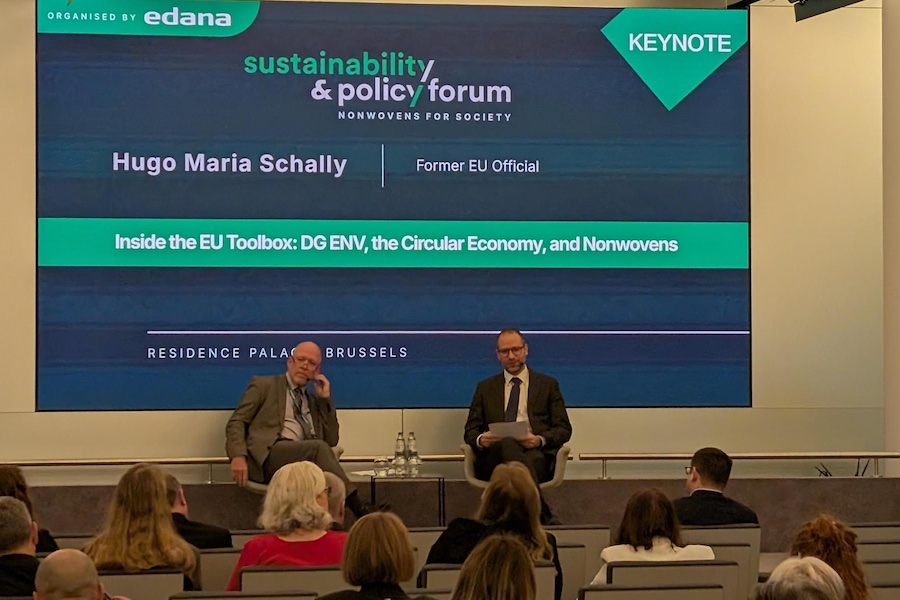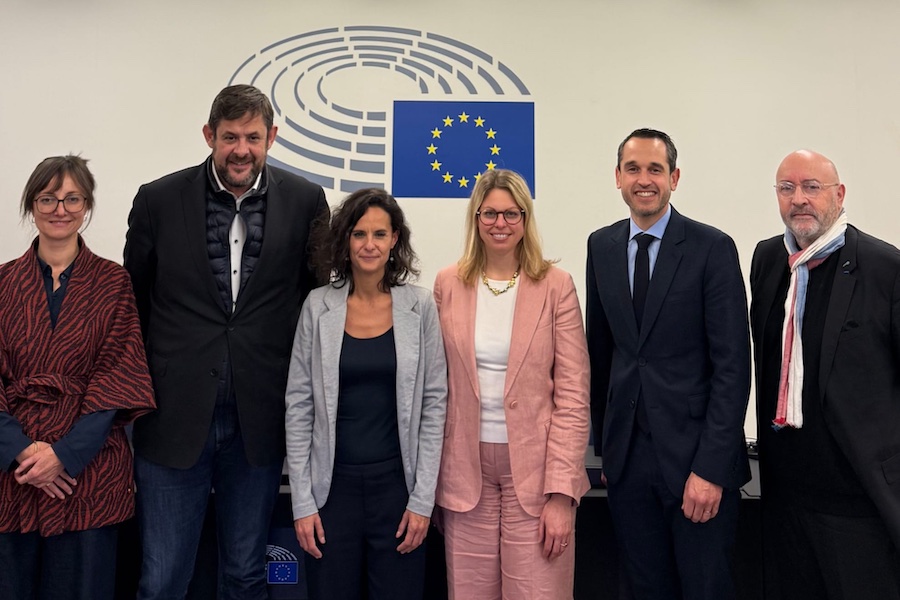#Europe
European Green Deal: Commission proposes transformation of EU economy and society to meet climate ambitions
With today's proposals, the Commission is presenting the legislative tools to deliver on the targets agreed in the European Climate Law and fundamentally transform our economy and society for a fair, green and prosperous future.
A comprehensive and interconnected set of proposals
Today's proposals will enable the necessary acceleration of greenhouse gas emission reductions in the next decade. They combine: application of emissions trading to new sectors and a tightening of the existing EU Emissions Trading System; increased use of renewable energy; greater energy efficiency; a faster roll-out of low emission transport modes and the infrastructure and fuels to support them; an alignment of taxation policies with the European Green Deal objectives; measures to prevent carbon leakage; and tools to preserve and grow our natural carbon sinks.
- The EU Emissions Trading System (ETS) puts a price on carbon and lowers the cap on emissions from certain economic sectors every year. It has successfully brought down emissions from power generation and energy-intensive industries by 42.8% in the past 16 years. Today the Commission is proposing to lower the overall emission cap even further and increase its annual rate of reduction. The Commission is also proposing to phase out free emission allowances for aviation and align with the global Carbon Offsetting and Reduction Scheme for International Aviation (CORSIA) and to include shipping emissions for the first time in the EU ETS. To address the lack of emissions reductions in road transport and buildings, a separate new emissions trading system is set up for fuel distribution for road transport and buildings. The Commission also proposes to increase the size of the Innovation and Modernisation Funds.
- To complement the substantial spending on climate in the EU budget, Member States should spend the entirety of their emissions trading revenues on climate and energy-related projects. A dedicated part of the revenues from the new system for road transport and buildings should address the possible social impact on vulnerable households, micro-enterprises and transport users.
- The Effort Sharing Regulation assigns strengthened emissions reduction targets to each Member State for buildings, road and domestic maritime transport, agriculture, waste and small industries. Recognising the different starting points and capacities of each Member State, these targets are based on their GDP per capita, with adjustments made to take cost efficiency into account.
- Member States also share responsibility for removing carbon from the atmosphere, so the Regulation on Land Use, Forestry and Agriculture sets an overall EU target for carbon removals by natural sinks, equivalent to 310 million tonnes of CO2 emissions by 2030. National targets will require Member States to care for and expand their carbon sinks to meet this target. By 2035, the EU should aim to reach climate neutrality in the land use, forestry and agriculture sectors, including also agricultural non-CO2 emissions, such as those from fertiliser use and livestock. The EU Forest Strategy aims to improve the quality, quantity and resilience of EU forests. It supports foresters and the forest-based bioeconomy while keeping harvesting and biomass use sustainable, preserving biodiversity, and setting out a plan to plant three billion trees across Europe by 2030.
- Energy production and use accounts for 75% of EU emissions, so accelerating the transition to a greener energy system is crucial. The Renewable Energy Directive will set an increased target to produce 40% of our energy from renewable sources by 2030. All Member States will contribute to this goal, and specific targets are proposed for renewable energy use in transport, heating and cooling, buildings and industry. To meet both our climate and environmental goals, sustainability criteria for the use of bioenergy are strengthened and Member States must design any support schemes for bioenergy in a way that respects the cascading principle of uses for woody biomass.
- To reduce overall energy use, cut emissions and tackle energy poverty, the Energy Efficiency Directive will set a more ambitious binding annual target for reducing energy use at EU level. It will guide how national contributions are established and almost double the annual energy saving obligation for Member States. The public sector will be required to renovate 3% of its buildings each year to drive the renovation wave, create jobs and bring down energy use and costs to the taxpayer.
- A combination of measures is required to tackle rising emissions in road transport to complement emissions trading. Stronger CO2 emissions standards for cars and vans will accelerate the transition to zero-emission mobility by requiring average emissions of new cars to come down by 55% from 2030 and 100% from 2035 compared to 2021 levels. As a result, all new cars registered as of 2035 will be zero-emission. To ensure that drivers are able to charge or fuel their vehicles at a reliable network across Europe, the revised Alternative Fuels Infrastructure Regulation will require Member States to expand charging capacity in line with zero-emission car sales, and to install charging and fuelling points at regular intervals on major highways: every 60 kilometres for electric charging and every 150 kilometres for hydrogen refuelling.
- Aviation and maritime fuels cause significant pollution and also require dedicated action to complement emissions trading. The Alternative Fuels Infrastructure Regulation requires that aircraft and ships have access to clean electricity supply in major ports and airports. The ReFuelEU Aviation Initiative will oblige fuel suppliers to blend increasing levels of sustainable aviation fuels in jet fuel taken on-board at EU airports, including synthetic low carbon fuels, known as e-fuels. Similarly, the FuelEU Maritime Initiative will stimulate the uptake of sustainable maritime fuels and zero-emission technologies by setting a maximum limit on the greenhouse gas content of energy used by ships calling at European ports.
- The tax system for energy products must safeguard and improve the Single Market and support the green transition by setting the right incentives. A revision of the Energy Taxation Directive proposes to align the taxation of energy products with EU energy and climate policies, promoting clean technologies and removing outdated exemptions and reduced rates that currently encourage the use of fossil fuels. The new rules aim at reducing the harmful effects of energy tax competition, helping secure revenues for Member States from green taxes, which are less detrimental to growth than taxes on labour.
- Finally, a new Carbon Border Adjustment Mechanism will put a carbon price on imports of a targeted selection of products to ensure that ambitious climate action in Europe does not lead to ‘carbon leakage'. This will ensure that European emission reductions contribute to a global emissions decline, instead of pushing carbon-intensive production outside Europe. It also aims to encourage industry outside the EU and our international partners to take steps in the same direction.
These proposals are all connected and complementary. We need this balanced package, and the revenues it generates, to ensure a transition which makes Europe fair, green and competitive, sharing responsibility evenly across different sectors and Member States, and providing additional support where appropriate.
A Socially Fair Transition
While in the medium- to long-term, the benefits of EU climate policies clearly outweigh the costs of this transition, climate policies risk putting extra pressure on vulnerable households, micro-enterprises and transport users in the short run. The design of the policies in today's package therefore fairly spreads the costs of tackling and adapting to climate change.
In addition, carbon pricing instruments raise revenues that can be reinvested to spur innovation, economic growth, and investments in clean technologies. A new Social Climate Fund is proposed to provide dedicated funding to Member States to help citizens finance investments in energy efficiency, new heating and cooling systems, and cleaner mobility. The Social Climate Fund would be financed by the EU budget, using an amount equivalent to 25% of the expected revenues of emissions trading for building and road transport fuels. It will provide €72.2 billion of funding to Member States, for the period 2025-2032, based on a targeted amendment to the multiannual financial framework. With a proposal to draw on matching Member State funding, the Fund would mobilise €144.4 billion for a socially fair transition.
The benefits of acting now to protect people and the planet are clear: cleaner air, cooler and greener towns and cities, healthier citizens, lower energy use and bills, European jobs, technologies and industrial opportunities, more space for nature, and a healthier planet to hand over to future generations. The challenge at the heart of Europe's green transition is to make sure the benefits and opportunities that come with it are available to all, as quickly and as fairly as possible. By using the different policy tools available at EU level we can make sure that the pace of change is sufficient, but not overly disruptive.
Background
The European Green Deal, presented by the Commission on 11 December 2019, sets the goal of making Europe the first climate-neutral continent by 2050. The European Climate Law, which enters into force this month, enshrines in binding legislation the EU's commitment to climate neutrality and the intermediate target of reducing net greenhouse gas emissions by at least 55% by 2030, compared to 1990 levels.The EU's commitment to reduce its net greenhouse gas emissions by at least 55% by 2030 was communicated to the UNFCCC in December 2020 as the EU's contribution to meeting the goals of the Paris Agreement.
As a result of the EU's existing climate and energy legislation, the EU's greenhouse gas emissions have already fallen by 24% compared to 1990, while the EU economy has grown by around 60% in the same period, decoupling growth from emissions. This tested and proven legislative framework forms the basis of this package of legislation.
The Commission has conducted extensive impact assessments before presenting these proposals to measure the opportunities and costs of the green transition. In September 2020 a comprehensive impact assessment underpinned the Commission's proposal to increase the EU's 2030 net emissions reduction target to at least 55%, compared to 1990 levels. It showed that this target is both achievable and beneficial. Today's legislative proposals are supported by detailed impact assessments, taking into account the interconnection with other parts of the package.
The EU's long-term budget for the next seven years will provide support to the green transition. 30% of programmes under the €2 trillion 2021-2027 Multiannual Financial Framework and NextGenerationEU are dedicated to supporting climate action; 37% of the €723.8 billion (in current prices) Recovery and Resilience Facility, which will finance Member States' national recovery programmes under NextGenerationEU, is allocated to climate action.
Members of the College said:
President of the European Commission, Ursula von der Leyen, said: “The fossil fuel economy has reached its limits. We want to leave the next generation a healthy planet as well as good jobs and growth that does not hurt our nature. The European Green Deal is our growth strategy that is moving towards a decarbonised economy. Europe was the first continent to declare to be climate neutral in 2050, and now we are the very first ones to put a concrete roadmap on the table. Europe walks the talk on climate policies through innovation, investment and social compensation.”
Executive Vice-President for the European Green Deal, Frans Timmermans, said: “This is the make-or-break decade in the fight against the climate and biodiversity crises. The European Union has set ambitious targets and today we present how we can meet them. Getting to a green and healthy future for all will require considerable effort in every sector and every Member State. Together, our proposals will spur the necessary changes, enable all citizens to experience the benefits of climate action as soon as possible, and provide support to the most vulnerable households. Europe's transition will be fair, green and competitive.
Commissioner for Economy, Paolo Gentiloni, said: “Our efforts to tackle climate change need to be politically ambitious, globally coordinated and socially fair. We are updating our two-decades old energy taxation rules to encourage the use of greener fuels and reduce harmful energy tax competition. And we are proposing a carbon border adjustment mechanism that will align the carbon price on imports with that applicable within the EU. In full respect of our WTO commitments, this will ensure that our climate ambition is not undermined by foreign firms subject to more lax environmental requirements. It will also encourage greener standards outside our borders. This is the ultimate now or never moment. With every passing year the terrible reality of climate change becomes more apparent: today we confirm our determination to act before it is really too late.”
Commissioner for Energy, Kadri Simson, said: “Reaching the Green Deal goals will not be possible without reshaping our energy system – this is where most of our emissions are generated. To achieve climate-neutrality by 2050, we need to turn the renewables evolution into a revolution and make sure no energy is wasted along the way. Today's proposals set more ambitious targets, remove barriers and add incentives so that we move even faster towards a net-zero energy system.”
Commissioner for Transport, Adina Valean, said: “With our three transport-specific initiatives – ReFuel Aviation, FuelEU Maritime and the Alternative Fuels Infrastructure Regulation – we will support the transport sector's transition into a future-proof system. We will create a market for sustainable alternative fuels and low-carbon technologies, while putting in place the right infrastructure to ensure the broad uptake of zero-emission vehicles and vessels. This package will take us beyond greening mobility and logistics. It is a chance to make the EU a lead-market for cutting-edge technologies.”
Commissioner for Environment, Oceans and Fisheries, Virginijus Sinkevicius, said: “Forests are a big part of the solution to many of the challenges we face in tackling climate and biodiversity crises. They are also key to delivering the EU's 2030 climate targets. But current conservation status of forests is not favourable in the EU. We must increase the use of biodiversity-friendly practices and secure the health and resilience of forest ecosystems. The Forest Strategy is a real game changer in the way we protect, manage and grow our forests, for our planet, people and the economy.”
Commissioner for Agriculture, Janusz Wojciechowski, said: “Forests are essential in the fight against climate change. They also provide jobs and growth in rural areas, sustainable material to develop the bioeconomy, and valuable ecosystem services to our society. The Forest Strategy, by addressing the social, economic and environmental aspects all together, aims at ensuring and enhancing the multifunctionality of our forests and highlights the pivotal role played by millions of foresters working on the grounds. The new Common Agricultural Policy will be an opportunity for more targeted support to our foresters and to the sustainable development of our forests”.

















